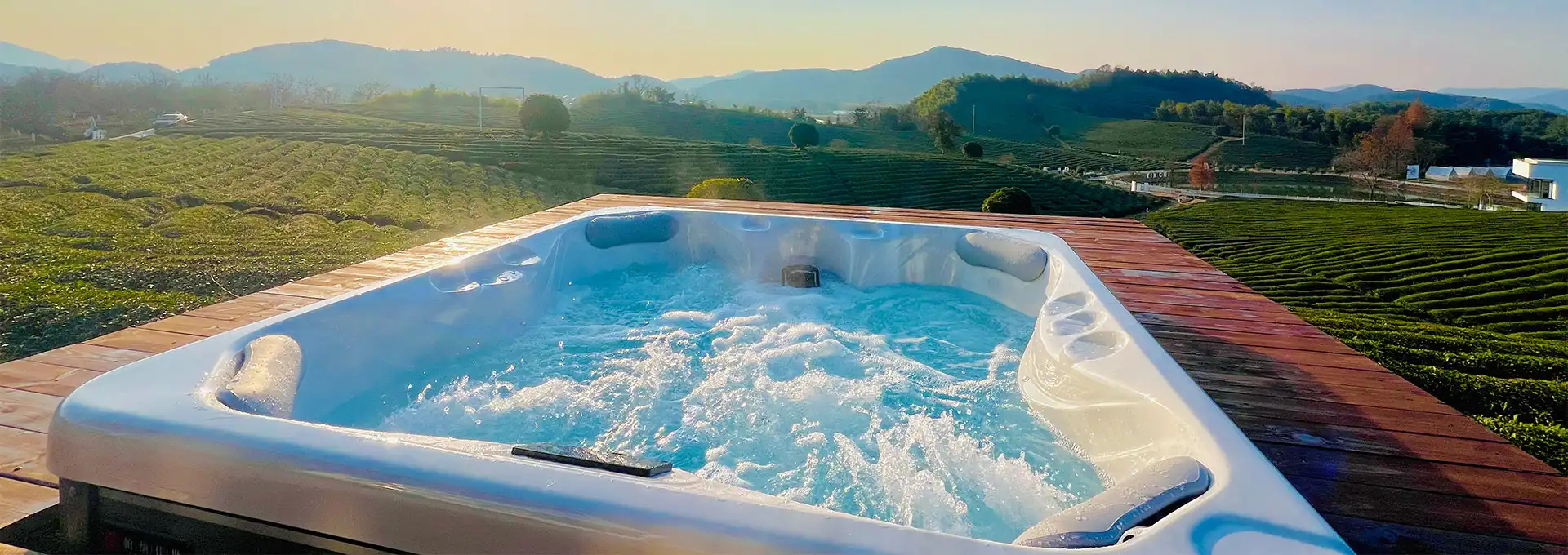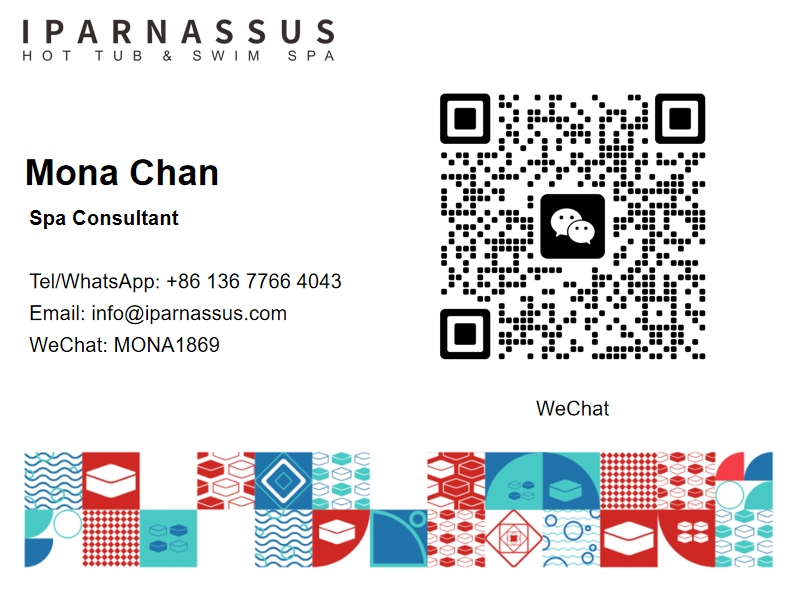Hot Tub Maintenance: A Guide for Middle Eastern Hoteliers
2024-11-04 17:59:44
The management and maintenance of luxury hot tubs in Middle Eastern hotels present a unique set of challenges that require careful attention and specialized knowledge. The region's distinctive climate characteristics, marked by high temperatures and significant dust exposure, combined with specific water quality considerations, make it essential for hoteliers to implement comprehensive maintenance strategies. Understanding these regional nuances is crucial for maintaining the highest standards of guest satisfaction while ensuring operational efficiency and cost-effectiveness. The successful operation of hotel hot tubs in the Middle East requires a delicate balance between providing luxurious guest experiences and addressing practical maintenance concerns that are specific to the area's environmental conditions.
Your Partner in Luxury Spa Solutions
Shenzhen Iparnassus Intelligent Spas Co., LTD specializes in resort hot tubs and infinity pool spa systems. Our hot tubs are equipped with circulation filtration and disinfection systems, reducing the need for frequent water changes. With professional design, R&D, production, sales, and after-sales service teams, we've obtained over 30 patents as of 2023. The iParnassus® brand operates globally across dozens of countries and regions. For Middle Eastern hotel bulk purchasing cooperation: 1. Free custom mold support; 2. Free control system upgrade with hotel centralized management system; 3. Direct cooperation with top manufacturers, passing savings directly to hotels; 4. North American materials and standards at competitive prices. We provide high-end quality products with reliable after-sales service, with products sold to more than 20 countries worldwide. Contact info@iparnassus.com for more details.
How Does Water Quality Impact Hot Tub Maintenance in Middle Eastern Hotels?
The management of water quality in Middle Eastern hotel hot tubs requires a sophisticated and multifaceted approach that takes into account the region's unique water characteristics and environmental conditions. The naturally high mineral content found in local water sources, combined with limited water resources, necessitates the implementation of advanced treatment systems and careful monitoring protocols. Hotels must contend with elevated levels of total dissolved solids (TDS), which can affect both equipment performance and guest comfort. This challenge is compounded by the region's high evaporation rates, which can concentrate minerals and contaminants in the water over time. Successful water quality management requires the integration of multiple treatment technologies, including advanced filtration systems, water softening equipment, and scale inhibition solutions. These systems work in concert to maintain optimal water quality while minimizing water waste and protecting expensive equipment from mineral buildup and corrosion.
Advanced filtration systems play a crucial role in maintaining water quality and must be carefully selected to handle the specific challenges of Middle Eastern operations. Multi-stage filtration systems, incorporating both mechanical and chemical filtration processes, are essential for removing fine dust particles, organic matter, and dissolved contaminants. These systems must be robust enough to handle continuous operation in high-temperature environments while maintaining energy efficiency. Regular maintenance schedules must be established to ensure optimal filter performance, including backwashing procedures and media replacement. Modern automated monitoring systems can help optimize these processes by providing real-time data on filter performance and water quality parameters.
Water conservation strategies are particularly crucial in the Middle East, where water resources are limited and costly. Implementation of water recycling systems, efficient backwashing procedures, and smart water management technologies can significantly reduce water consumption while maintaining high quality standards. These systems must be carefully designed to balance conservation goals with the need to maintain proper water chemistry and clarity. Advanced water management systems can help track water usage patterns, identify potential savings opportunities, and ensure compliance with local environmental regulations while maintaining the luxury experience expected by hotel guests.
What Are the Essential Chemical Balance Parameters for Hotel Hot Tubs?
Maintaining proper chemical balance in hotel hot tubs requires a comprehensive understanding of water chemistry and the implementation of precise control systems. The interaction between various chemical parameters, including pH, sanitizer levels, and total alkalinity, creates a complex system that must be carefully managed to ensure both safety and comfort. Modern chemical control systems utilize advanced sensing technologies and automated dosing equipment to maintain optimal chemical levels continuously. These systems must be capable of responding quickly to changes in water chemistry caused by factors such as high bather loads, environmental conditions, and the introduction of contaminants. Regular calibration and maintenance of these systems are essential to ensure accurate readings and proper chemical dosing.
The maintenance of proper sanitizer levels requires careful attention to both primary and secondary sanitization systems. Primary sanitizers, such as chlorine or bromine, must be maintained at precise levels to ensure effective disinfection while avoiding guest discomfort. Secondary sanitization systems, including UV treatment and ozone generation, can help reduce the required levels of chemical sanitizers while providing additional protection against pathogens. The integration of these systems must be carefully planned to ensure optimal performance and efficiency. Automated chemical feeders and monitoring systems can help maintain consistent sanitizer levels while reducing the workload on maintenance staff.
Alkalinity management is crucial for maintaining stable pH levels and protecting equipment from corrosion. The relationship between alkalinity and pH must be carefully balanced to ensure optimal water chemistry while minimizing scale formation and equipment damage. Regular testing and adjustment of alkalinity levels help maintain proper buffer capacity and prevent rapid pH fluctuations. This process requires careful attention to water chemistry principles and the use of appropriate adjustment chemicals. Documentation of all chemical adjustments and test results is essential for maintaining consistent water quality and ensuring compliance with health regulations.
How Often Should Hotels Service Their Hot Tub Filtration Systems?
The maintenance of hotel hot tub filtration systems requires a carefully structured approach that encompasses daily, weekly, and monthly service requirements. Daily maintenance tasks form the foundation of proper hot tub operation and must be consistently performed to maintain water quality and guest satisfaction. These tasks include regular water testing, chemical adjustments, and physical cleaning of accessible components. The implementation of standardized procedures and documentation systems helps ensure that all necessary tasks are completed properly and on schedule. Training programs for maintenance staff must emphasize the importance of these daily tasks and provide clear instructions for their proper execution.
Weekly maintenance procedures provide a deeper level of care that helps prevent potential problems and ensure optimal system performance. These procedures include thorough cleaning of filtration components, comprehensive water testing, and detailed inspection of all system components. The scheduling of these tasks must be carefully planned to minimize disruption to hotel operations while ensuring that all necessary maintenance is performed. Documentation of weekly maintenance activities helps track system performance over time and identify potential issues before they become serious problems.
Monthly service procedures represent the most comprehensive level of maintenance and include detailed inspection and servicing of all system components. These procedures help ensure long-term reliability and performance while identifying any developing issues that require attention. The evaluation of filter cartridge condition, inspection of mechanical components, and assessment of overall system performance are crucial elements of monthly maintenance. Regular review of maintenance records and system performance data helps optimize maintenance schedules and identify opportunities for improvement.
The implementation of advanced water treatment solutions has significantly evolved with the integration of modern technology in hot tub systems. Continuous circulation systems operating 24/7 provide constant filtration and treatment of water, while energy-efficient pumping systems help minimize operational costs. Smart flow control systems optimize water circulation patterns to ensure effective treatment while minimizing energy consumption. The integration of UV-C treatment systems, ozone generation, and salt chlorination options provides multiple barriers against contaminants while reducing the reliance on traditional chemical sanitizers.
Regional considerations play a crucial role in the operation of hotel hot tubs in the Middle East. The high ambient temperatures characteristic of the region affect both water chemistry and equipment performance, requiring careful attention to temperature control and chemical balance. The presence of airborne dust and sand necessitates more frequent cleaning and filtration system maintenance. Evaporation control becomes particularly important in the hot, dry climate, requiring the implementation of specialized covers and water management strategies. The selection of appropriate equipment and treatment systems must take these regional factors into account to ensure reliable operation and optimal performance.
Water conservation strategies take on particular importance in the Middle East, where water resources are limited and costly. The implementation of water recovery systems, including backwash water recycling and evaporation reduction measures, helps minimize water consumption while maintaining proper operation. Smart water replacement scheduling ensures that water quality is maintained while minimizing waste. The optimization of filtration systems through the use of high-efficiency filter media and proper backwashing techniques helps maximize the effectiveness of water treatment while minimizing water consumption. Regular staff training and the implementation of clear maintenance protocols help ensure that water conservation measures are properly implemented and maintained.
For more information on hot tub installations and our products, please feel free to contact us at info@iparnassus.com.
References:
1. World Health Organization. (2023). Guidelines for Safe Recreational Water Environments: Volume 2 Swimming Pools and Similar Environments.
2. Association of Pool & Spa Professionals. (2024). Commercial Pool and Spa Operations Handbook.
3. Middle East Facility Management Association. (2023). Best Practices Guide for Hotel Amenity Maintenance.
4. International Journal of Hospitality Management. (2023). "Water Management in Middle Eastern Hotels: Challenges and Solutions."
5. Journal of Environmental Management. (2024). "Sustainable Water Treatment Methods for Commercial Spas in Arid Regions."
Send Inquiry
Related Industry Knowledge
- Are Foam Filters Better for Hot Tubs?
- What is Normal Hot Tub Temperature?
- Is It OK to Go in Hot Tub After Eating?
- How Long to Wait After Adding Chlorine to Hot Tub?
- Can You Go in a Hot Tub with a Sunburn?
- How to Drain My Swim Spa?
- Does a Hot Tub Help Digestion?
- How to Raise pH in Swim Spa?
- Do you need a permit for an inflatable hot tub?
- How to Boost Alkalinity in Hot Tub?



